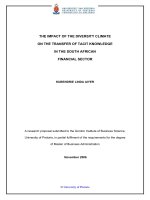Global business in local culture the impact of embedded multinational enterprises (springerbriefs in economics)
Bạn đang xem bản rút gọn của tài liệu. Xem và tải ngay bản đầy đủ của tài liệu tại đây (813.07 KB, 117 trang )
SpringerBriefsinEconomics
SpringerBriefspresentconcisesummariesofcutting-edgeresearchandpracticalapplications
acrossawidespectrumoffields.Featuringcompactvolumesof50to125pages,theseries
coversarangeofcontentfromprofessionaltoacademic.
Typicaltopicsmightinclude:
Atimelyreportofstate-of-theartanalyticaltechniques
Abridgebetweennewresearchresults,aspublishedinjournalarticles,andacontextual
literaturereview
Asnapshotofahotoremergingtopic
Anin-depthcasestudyorclinicalexample
Apresentationofcoreconceptsthatstudentsmustunderstandinordertomake
independentcontributions
SpringerBriefsinEconomicsshowcaseemergingtheory,empiricalresearch,andpractical
applicationinmicroeconomics,macroeconomics,economicpolicy,publicfinance,
econometrics,regionalscience,andrelatedfields,fromaglobalauthorcommunity.
Briefsarecharacterizedbyfast,globalelectronicdissemination,standardpublishing
contracts,standardizedmanuscriptpreparationandformattingguidelines,andexpedited
productionschedules.
Moreinformationaboutthisseriesathttp://www.springer.com/series/8876
PhilippAerni
GlobalBusinessinLocalCulture
TheImpactofEmbeddedMultinationalEnterprises
PhilippAerni
CenterforCorporateResponsibilityandSustainability(CCRS)attheUniversityofZurich,
Zürich,Switzerland
ISSN2191-5504
e-ISSN2191-5512
SpringerBriefsinEconomics
ISBN978-3-030-03797-0
e-ISBN978-3-030-03798-7
/>LibraryofCongressControlNumber:2018960733
©TheAuthor(s),underexclusivelicensetoSpringerNatureSwitzerlandAG2018
Thisworkissubjecttocopyright.Allrightsaresolelyandexclusivelylicensedbythe
Publisher,whetherthewholeorpartofthematerialisconcerned,specificallytherightsof
translation,reprinting,reuseofillustrations,recitation,broadcasting,reproductionon
microfilmsorinanyotherphysicalway,andtransmissionorinformationstorageand
retrieval,electronicadaptation,computersoftware,orbysimilarordissimilarmethodology
nowknownorhereafterdeveloped.
Theuseofgeneraldescriptivenames,registerednames,trademarks,servicemarks,etc.in
thispublicationdoesnotimply,evenintheabsenceofaspecificstatement,thatsuchnames
areexemptfromtherelevantprotectivelawsandregulationsandthereforefreeforgeneral
use.
Thepublisher,theauthorsandtheeditorsaresafetoassumethattheadviceandinformation
inthisbookarebelievedtobetrueandaccurateatthedateofpublication.Neitherthe
publishernortheauthorsortheeditorsgiveawarranty,expressorimplied,withrespectto
thematerialcontainedhereinorforanyerrorsoromissionsthatmayhavebeenmade.The
publisherremainsneutralwithregardtojurisdictionalclaimsinpublishedmapsand
institutionalaffiliations.
ThisSpringerimprintispublishedbytheregisteredcompanySpringerNatureSwitzerlandAG
Theregisteredcompanyaddressis:Gewerbestrasse11,6330Cham,Switzerland
Preface
Iwasinmyearlyteenswhenmyteacher,amemberofaradicalSwissleft-wingparty,
encouragedmetoaskcriticalquestionsaboutthefoundationsofouraffluenceinSwitzerland.
Iagreedwithhimthatourwealthmustberelatedtothewidespreadpovertyelsewhere.In
otherwords,heconvincedmethatinternationaltradeandForeignDirectInvestment(FDI)
mustbeazero-sumgamethatmerelybenefitsonepartyattheexpenseofanother,reflecting
thenatureofcapitalismasasystemofexploitation.Italsomademebelieveinourobligation
tomakeupforthedamagewecauseelsewherebygivinggenerousfinancialsupportfor
overseasdevelopmentassistance.
OnlywhenIwrotemyMasterthesisinGeographyinthemid-1990sontheproblemof
indebtednessofmountainfarmersinvolvedincommercialagricultureinGuatemala,I
realizedthatthesituationismorecomplex.Foreignaidisnotnecessarilythesolutionbutcan
alsobepartoftheproblem,whereasFDIisnotnecessarilytheproblembutcanalsobepartof
thesolution.
Yet,whenIpresentedthefindingsofmyfieldresearchtomythesisadvisorsinGeography
andEconomicsbackhome,theywerenotimpressed.Theyespeciallydislikedthefactthat,
basedonmypriorinductivefieldresearchinGuatemala,Idevelopedmyownhypothesison
thecircumstancesthatincreasetheriskoffarmhouseholdstobecomeindebted.Iempirically
testedthishypothesisthrougharepresentativefarmhouseholdsurveyanddataprovidedby
thecooperativethatsupportedtheselectedfarmers.Theresultswerenotinlinewiththe
theoriesneitherindevelopmenteconomicsnorinhumangeography.Ibelievedthatthe
inconsistencybetweentheoryandempiricalevidenceonthegroundwasrelatedtothefact
thatthetheoriesweredevelopedduringtheColdWarperiod,when‘development
cooperation’stillservedaconcretepurposeofforeignpolicy,namelytoensurethataclient
stateintheGlobalSouthwillnotsuddenlychangesidesintheglobalconfrontationbetween
thetwosuperpowers,theUnitedStatesandtheSovietUnion,andtheirrespectiveallies.
Thesituationinthe1990swasverydifferentbecausethebipolarturnedgraduallyintoa
multipolarworldorder.Atthesametime,thestartofthedigitalrevolutionmadeiteasierfor
low-incomecountriestocatchup,providedthatgovernmentscreatedthenecessaryenabling
environmenttoattractlong-terminvestmentsfromMultinationalEnterprises(MNEs)that
werealsowillingtoembedthemselvesintothelocaleconomy.Thedigitalrevolutionalso
madeiteasierforwatchdogorganisationstodetectandpublicizecorporateabuse.The
resultingglobalknowledge-basedeconomydidnotnecessarilybecomemorestablebutit
definitelycontributedtotheeconomicempowermentofmanycountriesthatpreviously
belongedtotheverypoorestintheworld.Theeconomicrisemadeitpossibleformanyof
theseemergingeconomiestonotjustcompetewiththeestablishedwesterneconomiesand
Japan,butalsotopursuetheirown,economicallymorepragmatictypeofdevelopment
assistancethroughSouth-SouthCollaboration.
Thesechangesintherealworldeconomydidhoweverhardlyaffectthecurriculainsocial
sciencedisciplinessuchaseconomicsorhumangeography.Economicscontinuestodefine
itselfasthescienceoftheoptimalallocationofscarceresourceseventhoughtheresource
‘knowledge’,thefoundationoftoday’sglobalknowledgeeconomy,isnotscarce.Unlikescarce
materialgoods,knowledgeisanintangiblegoodthatdoesnotdecreasebutactuallyincreases
invalue,themoreitisused,asPaulRomer,nobelprizewinnerineconomicsin2018,pointed
out.Sinceentrepreneursaretheonesthatmakeuseofnewknowledgetocreateinnovations
thathelpaddressscarcityproblems,theyplayacrucialroleinenablingsustainablechangein
the21stcentury.Entrepreneursremainhoweverablackboxineconomics.
HumanGeography,inreturn,mayuseadifferentjargonbutcontinuestobeguidedbythe
baselineassumptionsofColdWartheoriesthatdealtwiththeculturallegacyoftheformer
colonialruletoexplain‘underdevelopment’.Suchtheoriestendtoframelow-income
economiesperseas‘vulnerable’intheglobalsystemofeconomicexchange.Tolabelits
people‘vulnerable’hashowevertheimplicitconsequenceofdenyingthemtheroleofactive
economicagentsbeyondtheirneighbourhoods.Aspassivevictimsofexternaleconomic
shocks,theymustbesupportedthrougheffectiveresiliencestrategiesrecommendedand
fundedbyforeignexperts.Theresultofthesewell-meantexternalinterventionsisoftenmore
economicdependence,notless.
Sowhydothesetheoriesremainsopopular?Maybebecausetheassumptionthat
economicglobalizationiseitherazero-sumgameormerelycreatestinyefficiencygains
throughtradeattheexpenseoflargenegativesocialandenvironmentalexternalities,sounds
intuitivelyright.Theeconomichistorianandwell-knowncriticofeconomicglobalizationKarl
Polanyi,whocoinedtheterm‘embeddedness’inacademicliterature,describedthisnegative
effectsofeconomicglobalizationforlocalpeoplealreadyin1944inhisbook‘TheGreat
Transformation’.Hisearlywarningsaboutthedangersofunbridledmarketforcesforlocally
embeddedeconomicsystemsresonatewellwithmanycontemporarysocialscientists
concernedwithTrumpianauthoritarianism,theglobalsystemicrisksofcapitalism,business
andhumanrights,andsocialinequality.
Yet,oncewerecognizethatglobaltradeandFDIarenotzero-sumgames,likewar,or,in
mostcases,theformermilitary-backedneo-colonialrule,Polanyi’santi-globalization
narrativeappearslessadequatetoexplainthecomplexchallengeswefaceinthe21stcentury.
Alltheconcernsarereal,buttheywillnotgoawaybysimplyprotestingorbyadvocatinga
returnoldmodelsofsocialutopiathatfailedinpractice.Instead,thereisaneedforadjusting
andcombiningsocialsciencetheoriessothattheybecomemoreresponsivetotoday’sglobal
realities;theymustbuilduponacontextualanddynamicunderstandingofsustainabilityin
ordertoprovideafruitfultheoreticalfoundationforsustainablecollectiveactiondesignedto
notjustminimizetheexternalrisksbutalsoharnesstheexternalbenefitsofprivatesector
investmentforsocietyandtheenvironment.
ThepresentbookchallengesthesimpledistinctionmadebyPolanyiandhis
contemporarydisciplesbetweenthe‘desirable’localversusthe‘undesirable’global.Atthe
sametime,itproposesanalternativeinterdisciplinarysocialscienceapproachthatdrawson
insightsfromeconomicsociologyandbusinessresearch.Itillustratesunderwhich
institutionalframeworkconditions,globalbusinesswithacommitmenttolocal
embeddednessmaybecomelessofariskandmoreofanopportunitytolocaleconomic
empowermentandculturalrenewal.
Yes,MNEsarefreetochoosewheretoinvest,andtheytendtopicklocationswhere
productioncostsarelow.However,manyofthemarealsoawarethattheirinvestmentsdo
nottakeplaceinavacuum.IfMNEsonlyfeelaccountabletostakeholderselsewhere,theymay
eventuallyfacealocallegitimacyproblem.Inthiscontext,acommitmentto‘principled
embeddedness’mayhelpaddressexternalconcernsaboutcompliancewithprinciplesof
responsibleinvestmentaswellaslocalconcernsaboutinclusivegrowth.AnMNEmay
generateinclusivegrowthasaside-effectofitsinteresttoembeditselfintothelocal
economyandculture.ItslocalengagementmayalsoenabletheMNEtogainlocaltrustinthe
formofsocialcapital,whichincreasesitslocalacceptanceandthushelpssecuringitslicense
tooperate.
However,embeddingaglobalcompanyinlocalbusinessisfraughtwithcultural
misunderstandingsaswellaseconomicriskanduncertainty,especiallyinlowincome
countries.Itmayalsorequireasignificantamountofinvestmentintheupgradingoflocal
skills,capacitiesandinfrastructure,aswellaseffortstoreconcilelocalculturalhabitswiththe
necessitytocomplywiththeformalrulesofglobalbusiness.Inthissense,MNEsalonemay
nothavethemeansandthecompetencestosucceed;theydependinthisendeavouronlocal
partnersingovernment,civilsocietyandtheprivatesector.Iftheselocalstakeholdershelp
theMNEsucceedinthisventure,theyalsocontributetoaconsiderableamountofexternal
socialbenefitsthatresultfromembeddedFDI.Theseindirectbenefitsforthelocalpeopleand
theirenvironmentgofarbeyondofwhatiscalled‘spillovers’ineconomics.Afterall,an
embeddedMNEdoesnotjustbringmaterialgoodsintothecountryofdestinationbutalso
knowledgeandknow-howaswellasaccesstoglobalnetworksandcapital.Thesenontangibleresourcesareanessentialconditionforinclusiveandsustainablechange,acentral
objectiveoftheSustainableDevelopmentGoals(SDGs)oftheUnitedNations(UN).Theyarea
driverofeconomicintegrationprovidedthatsocietysupportstheselectivehybridizationof
globalbusinessandlocalculture.
Amajorobstacletomoresustainableglobaleconomicintegrationisthedefensiveframing
ofsustainabilityinpostmaterialistsocietiesingeneralandacademiainparticular.Itis
expressedinthepopularconcernthatglobaleconomicgrowthposesamerethreattolocal
sustainabilityandhumanrights.TheUNGuidingPrinciplesonBusinessandHumanRights
(UNGP)illustratesthiswithits‘donoharm’requirementforMNEs.ItignoresthatMNEsmay
alsohaveapotentialtodirectlyorindirectlyenhanceaccesstoessentialhumanrightssuchas
righttofood,water,shelter,education,healthetcthroughtheirlocalinvestments.Afterall,
theyoftenrepresenteconomicpowerhousesintherespectiveregionthatprovidelocaljobs
andenhancebusinessopportunitiesforlocalentrepreneurs.Theresultisanincreaseinlocal
incomepercapita,whichautomaticallyenhancesaccesstoessentialgoodsandservices.Yet,
neithertheUNGPnortheOECDGuidelinesforMultinationalEnterprises,thathavebeen
translatedintonationalactionplansforbusinessandhumanrights,suggesttobalancethe
potentialrisksagainstthepotentialbenefitsinhumanrightimpactassessmentsofMNEsin
lowincomecountries.
Theon-sidedfocusonriskavoidanceresultsinaglobalcomplianceandduediligence
bureaucracymainlyconcernedwithcorporatereputationmanagement.Thefocuson
preventingriskstendstodiscourageinvestmentsinlocalentrepreneurshipandinnovationin
high-riskeconomiesintheGlobalSouththatwoulddesperatelyneedmoreinvestment.This
ishoweveroflittleconcerntoanti-globalizationactivistswhoenvisiontherestorationof
somethingbetterthattheybelievemusthaveexistedprioreconomicglobalization.Asmedia
savvy‘epistemicbrokers’theirgloballycoordinatedprotestactionsprovidemeaningand
orientationbyconvertingcomplexlocalstoriesofresistanceintosimplifiedanddramatic
mythicalaccountsof‘bigbusiness’versus‘thepeople’.Bydoingso,theyoftenmisrepresent
thedemandforinclusivegrowththathasmobilizedlocalpeopleinthefirstplace.Inother
words,theydeprivelocalpeopleoftheirvoiceswhileclaimingtorepresenttheirconcerns.
Withtheiroftendivisiveandinflammatorylanguagetheyalsodiscourageeffective
cooperationbetweencivilsocietyandtheprivatesector,asenvisionedbySDG17onthe
creationofaglobalpartnership.Thefactthatmanyoftheseanti-globalizationcelebrities
neverthelessobtainhonorarydoctoratesfromsocialsciencedepartmentsatprestigious
universities,isanotherindicationfortheexistenceofaseriouscrisisoftheoryinthesocial
sciences.
Thebookproposestoovercomethepopularanti-globalizationnarrativebytellingan
alternativestoryofglobalization.Astorythatistoldbythelocalpeopleinlowincome
countriesthathavemadeanexperiencewithglobalbusiness.Thisexperiencemay
sometimesbepositive,andsometimesnegative,butithelpstoreachamoredifferentiated
viewthatalsorestoresagencytothelocalpeople.Oncetheirvoicesareheardin
postmaterialistsocieties,itmayinitiateareflectionprocessthatwillalsoimpactthe
willingnessofacademic,non-governmentandgovernmentinstitutionstoabandonoldbut
cherishedstereotypesandinsteadembarkonpragmaticcollectiveactionwiththeprivate
sector.
Theargumentsandpolicyrecommendationsinthisbookabouttheimpactofembedded
MNEs,thefacilitatingroleofdevelopmentassistanceandthepotentialofacademicresearch
andcivilsocietytobettercontributetotheSDGsarebasedoninsightsfrominterdisciplinary
socialscienceresearchandillustratedbymeansofselectedbusinesscasestudiesofMNEs
operatinginlow-incomecountries.Theyhighlightthechallengesandopportunitiesof
embeddedMNEsandhowtheycancontributetotheachievementoftheSDGs,ifcommitted
toresponsiblelocalinvestmentsandsupportedintheirembeddednessstrategybylocal
institutions.
Themotivationtowritethisbookistoagreatextentrootedinmypersonalbiographyas
ahumanbeingwhobelievesinthemoralobligationtoaskcriticalquestions,andasan
interdisciplinarysocialsciencescholarwhoisalarmedaboutthetrendinthesocialsciences
toreturntostrictlydisciplinaryacademiccareers—evenintimeswhenthedemandfor
interdisciplinaryknowledgeandfieldresearchisincreasinginsocietyworldwide.
Thecontentandthestructureofthebookhavebeensignificantlyinfluencedand
improvedthankstothevaluablefeedbackfromDouglasSouthgate,ConstantineBartel,
ThomasCottier,IsabelleSchluep,PaulSlovic,JayashreeWatal,andRonHerring.Iwouldliketo
thankthemallfortheproofreadingandtheirveryvaluablesuggestions.
IwouldalsoliketothankmymentorCalestousJuma,whosadlypassedawayinDecember
2017.
PhilippAerni
Zürich,Switzerland
Acronyms
ACRE AgricultureandClimateRiskEnterprise(ACRE)
AoA AgreementonAgriculture
ATDF AfricaTechnologyDevelopmentForum
B2B BusinesstoBusiness
B2C BusinesstoConsumer
BSCI BusinessSocialComplianceInitiative
CCRS CenterforCorporateResponsibilityandSustainability
CIME OECDCommitteeonInvestmentandMultinationalEnterprises
CORBANA CorporaciónBananeraNacionalCorbana
COSA CommitteeonSustainableAgriculture
CSR CorporateSocialResponsibility
CTI SwissFederalCommissiononTechnologyandInnovation
DA DevelopmentAssistance
DFID UKDepartmentforInternationalDevelopment
ESG Environment,Social,Governance
ETH SwissFederalInstituteofTechnology
FAO FoodandAgricultureOrganizationoftheUnitedNations
FDI ForeignDirectInvestment
FOAG SwissFederalOfficeofAgriculture
GBF GrainBulkingFacility
GDP GrossDomesticProduct
GI GeographicalIndication
GiZ GermanGroupforInternationalCooperation
GM GeneticallyModified
GMOs GeneticallyModifiedOrganisms
GVC GlobalValueChains
ICIJ InternationalConsortiumofInvestigativeJournalists
ICT InformationandCommunicationTechnologies
IFPRI InternationalFoodPolicyResearchInstitute
IMF InternationalMonetaryFund
IP IntellectualProperty
ISO InternationalOrganisationforStandardization
MDGs MillenniumDevelopmentGoals
MNC MultinationalCorporation
MNE MultinationalEnterprise
MRV Measurement,Reporting,Verification
NBL NileBreweriesLimited
NCPs NationalContactPoints
NGO Non-GovernmentOrganisation
NIMBY NotInMyBackyard
NRP NationalResearchProgram
OECD OrganisationforEconomicCo-operationandDevelopment
ORT OralRehydrationTherapy
PPP PubicPrivatePartnership
R4D ResearchforDevelopment
RA RainforestAlliance
SAN SustainableAgricultureNetwork
SDC SwissDevelopmentCooperation
SDGs UnitedNationsSustainableDevelopmentGoals
SECO SwissStateSecretariatforEconomicAffairs
SMEs Small-andmedium-sizedEnterprises
SNSF SwissNationalScienceFoundation
TAP TropicalAgriculturePlatform
TFA TradeFacilitationAgreementoftheWTO
TFP TotalFactorProductivity
TRIPS Trade-RelatedAspectsonIntellectualPropertyRights
UNCTAD UnitedNationsTradeandDevelopmentConference
UNDP UnitedNationsDevelopmentProgramme
UNGP UnitedNationsGuidingPrinciplesonBusinessandHumanRights
UP UttarPradesh
USAID UnitedStatesAgencyforInternationalDevelopment
UVAMA UgandaValueAddedMaizeAlliance
VAC VillageAggregationCenters
WEIRD Western,educated,industrialized,richanddemocratic
WHO WorldHealthOrganisation
WTO WorldTradeOrganisation
WWF WorldWildLifeFund
Contents
1Introduction
1.1KarlPolanyi’sInfluenceintheGlobalizationDebateofthe21stCentury
1.2TheBipolarMindsetinAcademia,CivilSocietyandGovernment
1.3AcknowledgingtheValueofCompaniesCommittedto‘PrincipledEmbeddedness’
1.4WhenMNEsBecomePartoftheSolutionRatherThanPartoftheProblem
1.5OfMythsandMovements
2SocietalFoundationsofEconomicDevelopment
2.1PolanyiastheCommonDenominatorofPost-structuralismandNeoclassical
Economics
2.2NoSuchThingasa‘GlobalizationParadox’
2.3Polanyias‘IntellectualGuide’inEconomicsandAnthropology
3Neoliberalism:AMythicalandMeaningfulTermDevoidofAnyDeepThought
3.1DidtheRent-SeekingEconomyofFeudalismServetheNeedsofthePeople?
3.2TheEnclosureMovementintheUKastheBeginningofIndustrialAgriculture
3.3BlamingAgriculturalTradeHasNeverSolvedAnyFoodSecurityProblem
3.4FernandBraudel’sCriticismofPolanyi’sInterpretationofHistory
3.5WhyPolanyi’sBipolarFramingFindsFertileGround
4TheImpactofPopularStereotypesinAcademicResearchandPublicPolicy
4.1EchoChambers:TheAttackonDemocracyfromWithin
4.2EmbeddedLiberalism:AFlawedConcept
4.2.1TheArtificialSeparationofthe‘Authentic’Localfromthe‘Generic’Global
Product
4.2.2GovernmentsastheBlamelessDefendersAgainstCarelessBigBusiness
4.2.3WhyMoreRegulationDoesnotLeadtoMorePublicTrust:TheCaseofGMOs
4.2.4Self-RegulationinIndustryasaBaseforSubsequentGovernment
Regulation
4.2.5WhytheRuggieFrameworkMayNotBeHarmless
4.3IndigenousCommunitiesasProjectionScreensforPreservedCultural
Embeddedness
4.3.1HowtheIndianChipkoMovementBecameaSymbolofNIMBY
Environmentalism
4.3.2MythsEmbodiedinScientificModelsthatGuideAcademicResearch
4.3.3‘EpistemicBrokers’inPostmaterialSocieties:TheCaseofVandanaShiva
4.3.4CulturalAppropriationandDenialofLocalAgency
4.3.5TheTemptationinAcademiatoUncriticallyEmbraceEnvironmental
Narratives
5TheNewUnderstandingoftheTerm‘Embeddedness’inEconomicSociology
5.1TheMoralDimensionofEntrepreneurship
5.2EmbeddednessasaWaytoAddressThreeMajorCoordinationProblems
5.3ValueasaCoordinationProblem
5.4CompetitionasaCoordinationProblem
5.5CooperationasaCoordinationProblem
5.6EmbeddednessintheContextofEconomicComplexity
6EconomicGlobalizationasa“Disembedding”Force?
6.1WhyDisembeddingTraditionalStructuresMayHelpOutsiders
6.2DisembeddingPost-ColonialStructures
6.3HowFDIContributedtoCatch-upGrowthandEconomicEmpowerment
6.4‘Knowledge’,anUnderusedResourceinEffortstoCopewithEnvironmental
Challenges
6.5TheFailureofForeignAidtoEmpowerLocalEntrepreneursThroughEconomic
Integration
6.5.1Self-ServingNatureofSwissSustainableTradePromotionandDevelopment
Research
6.5.2HowtheAnti-businessRhetoricofEpistemicBrokersSupportsIncumbents
6.5.3LocalGrowth-OrientedEntrepreneursasDriversofEconomicIntegration
7EmbeddedMNEsandTheirContributiontoSustainableChange
7.1CopingwithBusinessCoordinationProblemsThroughaStrategyof‘Principled
Embeddedness’
7.2TheUNGPandItsPotentialConflictwithPrincipledEmbeddedness
7.3TheRoleofSubsidiariesofMNEsinDevelopingCountries
7.4SelectedCasesof‘PrincipledEmbeddedness’ofSubsidiariesofMNEs
7.4.1NestléPhilippines:AnLocallyEmbeddedCompany
7.4.2Syngenta’sContributiontoCapacityDevelopmentforAgricultural
Innovation
7.4.3BataShoes:CreatingWelfarebyTakingRatherThanAvoidingRisk
7.4.4TheResponsibleEntrepreneurandtheSelflessCommunist
7.4.5Chiquita:APioneerinSustainableBananaProductionwithaLegacy
Problem
7.4.6TheProblemwithBusinesstoConsumerLabelsinAgriculture
7.5EmbeddednessandItsLinktoSustainabilityandCorporateResponsibility
8DevelopmentCooperationasaCatalystforSustainableLong-TermFDI
8.1HowDevelopmentAssistance(DA)CouldEncourageForeignDirectInvestment
(FDI)
8.1.1SourcingIngredientsforBeerProductioninUganda
8.1.2EmpoweringPastoralistsThroughBusinessDevelopmentinKenya
8.1.3EnablingAccesstoFinance:TheCaseofVodafone
8.2LessonsLearnedfromPublic-PrivatePartnerships(PPPs)
9ConcludingRemarks
References
©TheAuthor(s),underexclusivelicensetoSpringerNatureSwitzerlandAG2018
PhilippAerni,GlobalBusinessinLocalCulture,SpringerBriefsinEconomics
/>
1.Introduction
PhilippAerni1
(1) CenterforCorporateResponsibilityandSustainability(CCRS)attheUniversityofZurich,
Zürich,Switzerland
PhilippAerni
Email:
ThefamouseconomichistorianKarlPolanyicalledtheexpansionofformalglobalmarketsin
hisseminalbook‘TheGreatTransformation’(1944)a‘satanicmill’thatwouldleadtothe
disembeddednesslocalcommunitiesandtheirinformaleconomies.Polanyi’sframingof
economichistoryasastruggleof‘profitversuspeople’hasgainedrenewedattentioninthe
21stcentury.
RobertKuttner,anAmericanjournalistandsocialpolicyexpert,arguesinarecentessayin
theNewYorkReviewofBooks(Kuttner2017)thatausteritypoliciesinEuropeandthe
renewedpushforderegulationintheUnitedStateswouldreaffirmwhatPolanyicriticizedas
“theutopianendeavourofeconomicliberalismtosetupaself-regulatingmarketsystem”.
Thisendeavourwouldcrowdoutlocalcultureandcitizenship;leadtoextremeinequality,and
eventuallytriggerapoliticalcounter-movementtorestorehumanrightstoordinarypeople.
ThisbookdoesnotdefendEuropeanausteritypoliciesortheTrumpadministration’s
fondnessforderegulationofthedomesticeconomy—whilesimultaneouslyrejecting
multilateralisminthegovernanceoftheworldtradingsystem.Itdoesalsonotdenythe
countlesscorporatescandalsbeforeandaftertheglobalfinancialcrisisof2007–2008that
ruinedthelivesofmanyordinarypeople.Yet,itchallengesthepopularnarrativeofglobal
businessasasortofzero-sumgamethatmerelythrivesattheexpenseofsocietyandthe
environment.Inaworldcharacterizedbyahighdegreeofeconomicinterdependence,social
andgeographicalmobilityandtransboundaryenvironmentalandsocialchallenges,global
businesscannotberegardedanymoreassomethingexternalandalienthatisunrelatedto
ourpersonallivesandsocialnetworks.Wearealldirectlyorindirectlydependentonandalso
benefitfromitsproducts,servicesandinnovationsaslocalproducersaswellaslocal
consumers.Theglobalsustainabilitychallengeofthe21stcenturyisthereforenottogetrid
ofglobalbusinessbuttobetterharnessitspotentialtocontributetolocalsustainable
developmentandinclusivegrowth.
MultinationalEnterprises(MNEs)arethemainplayersinglobalbusinessandprobably
themostscrutinizedones.Thebeliefthattheirglobaloperationsarecompletelydetached
fromlocalculturalandsocialactivitiescontradictsthefactthatalleconomicrelations,
whetherglobalorlocal,arebasedonpriorsocialrelations.Inotherwords,thelocalcultural
dimensionshouldnotbepitchedagainsttheglobaleconomicdimensionbutmustinsteadbe
seenasitsfoundation.Thereis,ofcourse,corporatecultureandthereislocalculture.
However,thesearenottermsthatdescribeasteadystatebutrepresentdynamicprocesses
thatthriveonexchange.Embeddedforeigninvestmentsmaycontributetoafruitfulexchange
byrespondingtolocalconcernsandbycreatingnewlocaleconomicopportunitiesthrough
economicintegration.IfMNEswithacommitmenttoprincipledembeddedness1succeedin
becominganacceptedandrespectedplayerinthelocaleconomyandculture,these
companiesgainthenecessarysocialcapitaltosecuretheirlong-termlicensetooperate.In
otherwords,corporatesocialresponsibility(CSR)isbuiltintothelong-terminterestofsuch
firms.CSRthusceasestobeaseparatesectionwithaseparateagendawithintheMNE.
Instead,itbecomesanintegralpartofanoverallbusinessstrategydesignedtoensurethe
long-termsurvivalofthecompanywithinsociety.
ThepotentialcontributionofsuchMNEstosustainablechangeindevelopingeconomies
isseldomappreciatedbecauseitrunscountertothestereotypethatMNEsmerelyprivatize
profitswhilesocializingthecostsintheregionswheretheyinvest.2
Thegeneralviewthatglobalcompaniesdobusinessattheexpenseoflocalculturaland
economicactivitiesremainsfirmlyentrenchedinthesustainabilitydebateofaffluent
societies.Itoftenleadstoanexclusiveconcernforthedefenseofthelocal,thesearchofalikemindedonlineandofflinecommunitiesandthewithdrawalformanengagedpoliticaldebate.
Thementalitytendstobecapturedbytheterm‘NotinmyBackyard’(NIMBY),whichhasthe
unintendedconsequenceofencouragingculturalsegregationratherthaneconomic
integration.Yet,thebipolarviewofthe‘bad’globalandthe‘good’localthatunderpinsthis
staticanddefensiveviewofsustainabilityrunscountertotheSustainableDevelopmentGoals
(SDGs)whoaimtopromoteinclusivegrowth(SDG8)and,forthatpurpose,callforaglobal
partnership(SDG17)todevelophybridandtailor-madelocalsolutionstoeffectivelyaddress
thesignificantglobalsustainabilitychallengesofthe21stcentury.
1.1 KarlPolanyi’sInfluenceintheGlobalizationDebateofthe
21stCentury
Economicglobalizationisprimarilyassociatedwiththegrowthofmultinationalenterprises
(MNEs).TheyhavetheirheadquartersprimarilyinprosperouseconomiesinNorthAmerica,
Europe,andAsiaandfocusincreasinglyoninvestingindevelopingcountrieswherelandand
laborarestillrelativelycheap.
Economistsandpoliticalscientistswhorepresenttheschoolof‘EmbeddedLiberalism’
(Ruggie1982;Hays2009;Rodrik2011)andscholarsinthefieldof‘CorporateSocial
Responsibility’(CSR)(Schereretal.2006;Wettstein2010)regardthistrendaspotentially
disruptivefortraditionalcommunitiesandtheirlocallyembeddedeconomicsystems.Weak
lawenforcementcapabilitiesindevelopingcountrieswouldbeunabletoensurethe
protectionofhumanrightsofsuchcommunitiesandthereforepublicandprivateinitiatives
arerequiredtocompensateaffectedcommunitiesthroughagenerouswelfarestateorglobal
CSRinitiatives,respectively.
Theviewthattheprimarytaskofgovernmentsistotameunfetteredmarketforcesisnot
necessarilywrongbutincompleteandoftenaccompaniedbyanideologicalagendaand
vestedinterestsinpreservingthestatusquo.Ontheleftwingofthepoliticalspectrum,antiglobalizationactivistsdemandadditionalregulationdesignedtominimizethesocialand
environmentalrisksofglobalcorporateinvestment.Ontheothersideofthepolitical
spectrum,right-wingnationalistsframeglobaleconomicintegrationandmigrationasthreats
toculturalidentityandnationalsovereignty.Therecentpoliticalsuccessesofthefarrightin
NorthAmericaandEuropehavebeenmadepossiblebecauseofthesupportofthe
‘distributionallosers’ofglobalizationandthesedentarymiddleclassthatisconcernedabout
culturalandeconomicdecline.Theselosersfeelincreasinglydecoupledfromglobaleconomic
changeandnomorerepresentedbytheleftwingpoliticiansthathaveshiftedtheirconcerns
fromthedomesticworkerto‘vulnerableminorities’(Hopkin2017;Pepinsky2017;Reckwitz
2018).Theyaskforsimpleexplanationstocomplexproblems,andpoliticalentrepreneurs,
whoplaytheroleofepistemicbrokers,providesuchexplanationsbyusingpopularnarratives
of‘good’and‘evil’forces,andbyidentifyingplausiblescapegoats(AerniandBernauer2006).
Yet,theclaimthatanunfetteredglobaleconomyisdisruptingthelocaleconomiesinan
unprecedentedwaydoesnotcorrespondtotoday’srealityofmixedeconomieswiththeir
subsidiesandpolicyinterventionstoprotectthedomesticeconomyfromworldtrade
(Rogers2017).Suchprotectionistpolicies,especiallywhencombinedwithnon-tarifftrade
barriers,areoftenjustifiedbythealmostunquestionedchauvinisticassumptionthat
everythingproduceddomesticallyisautomaticallymoresustainableandofbetterquality
thansubstitutesproducedabroad.Suchprotectionistpoliciesoftenfavourpotent
incumbentsindomesticbusiness.Theyprimarilyaimatpreservingthestatusquobyarguing
infavourofprotectingthe‘embedded’nationaleconomy,understoodasahighlyregulated
economicsystemthatprotectsthelocalbusinessagainstdisruptiveeconomicchangedriven
byentrepreneurshipandinnovation.Foroutsiders,withinandwithoutthedomestic
economy,whodonotbenefitfromthesocialnetworkandthepoliticalconnectionsof
incumbentsintheresultingcorporatistsystem,suchan‘embedded’economyisprimarily
characterizedbynepotism(SchluepandAerni2016).Itstiflestheireconomicopportunities.
Therefore,entrepreneurialoutsidersseeeconomicglobalizationnotjustasathreat,butalso
anopportunitytoweakenthedominantpositionofincumbentsindomesticeconomiesand
makespaceformoreeconomicfreedom.Thechancesofsuchoutsiderstofindwaysaround
establishednetworksandcreatenewandscalablemarketshasincreasedwiththedigital
revolutionandtheriseoftheglobalknowledgeeconomy(Naam2013).Yet,public
resentmentagainstsuchagentsofchangepersists,especiallywhentheybecomesuccessful
andgrowbig.
1.2 TheBipolarMindsetinAcademia,CivilSocietyand
Government
Thenewopportunitiesofferedbytheglobalknowledgeeconomyofthe21stcenturyrequirea
criticalre-evaluationofPolanyi’sdualistworldviewthatguidedhisinterpretationof
economichistoryinthefirsthalfofthe20thcentury.
There-evaluationofPolanyitakesplaceinthesecond,thirdandfourthchapter,aswellas
Sect.7.3ofthepresentbook.Itbuildsuponexistingresearchineconomichistory(Braudel
1982;Stehr2008;Romer2010;Bang2016),economicsociology(Granovetter1985;
Zafirovski2002;Beckert2007),andindustrialpolicy(Uzzi1996;Meyeretal.2011).This
empiricalresearchchallengestheimplicitbaselineassumptionoftheschoolof‘embedded
liberalism’,whichisbasedonPolanyi’sargumentthattheglobalexpansionoftheformal
marketsystemposesanexclusivethreattolocallyembeddedeconomicsystemsandhuman
rights.TheclaimofPolanyi’scontemporarydisciplesthattheWorldTradeOrganisation
(WTO)merelyrepresentstheinterestsoftheglobalactorsattheexpenseoflocalinterestsis
showntobemisguidedinChap.2.Afterall,theWTOisaproductofcompromise.Itreflects
thewishofitsmemberstatestoparticipateinarule-basedeconomywithamplepolicyspace
thatalsotakesintoaccountnon-tradeconcernsotherthanrentseekingprotectionism.This
policyspace,incorporatedinthedifferentWTOAgreements,isespeciallysignificantfor
memberstatesthatbelongtothecategoryofLeastDevelopedCountries.Someglobal
activistswouldobjectbypointingoutthatmanyinterestgroupswereunderrepresentedin
thenegotiationsoftheWTOAgreements.Indigenouspeople,forexample,wouldfeel
threatenedintheirculturalidentitybytheexpansionofglobalbusinessencouragedbythe
WTO.Section4.3contradictsthisviewbypointingoutthatthelocalinterestsofindigenous
peopleareoftenmisrepresentedbytheglobalcivilsocietyorganizationsthatclaimto
representthemontheglobalstage.Afterall,Article21ofUnitedNationsDeclarationonthe
RightsofIndigenousPeoplesfrom2007clearlydemandsrespectfortheeconomicrightsof
indigenouspeople(righttoownership,righttoself-determinationandeconomic
development,equalitybeforejustice,freedomfromdiscrimination).Itindicatesthat
indigenouspeopleareasmuchinterestedinfaireconomicandculturalexchangeastheyare
inculturalpreservation.Theyareawarethattheirindigenouscultureonlyremainsattractive
tothenextgeneration,ifthereisculturalrenewalsupportedbyselectiveeconomic
integration.
Despitethelackofempiricalevidence,thebeliefthattheexpansionoftheformalglobal
economygoesattheexpenseoflocalpeoplewhodefendtheirlocalcultureandnatural
environmenthasbecomeverypopularincontemporaryaffluentsocietiessincetheyare
mainlyinterestedinpreservingthestatusquo,fromwhichtheybenefit.Sincetheirmaterial
needsarewelltakencareof,theyarelargelyconcernedwithpostmaterialneeds,especially
thesearchforidentityandmeaning.Inthiscontext,themythicalaccountsof‘localpeople’
versus‘globalprofit’spreadviasocialmediabywell-knownanti-globalizationactivists,such
asVandanaShiva,resonatewellwiththem.Theirmedia-coveredstoriesareoftenframedas
a‘DavidversusGoliath’dramaand,assuch,providemeaningandorientation.Thenarrative
maysoundsimpleandplausible,butitishighlymisleading.Afterall,norealprofit-oriented
economicactivityisdetachedfromindividuals(people)andtheirsocialnetworks
(communities),aseconomicsociologistshavepointedoutintheirembeddednessresearch.
Theembeddednessinsocialnetworksisespeciallycrucialwhenacompanyinvests
abroad.Itmustgainsocialcapitalintheregionofinvestmentbycontributingtothe
resolutionofthreemajorcoordinationproblems:theproblemofvalue,theproblemof
competitionandtheproblemofcooperation.Chapter5pointsoutthatforeigninvestorsmay
onlybeabletosecuretheirlong-termlicensetooperateinthehostcountryifthese
coordinationproblemsareadequatelyaddressedincollaborationwithlocalstakeholders.
Chapter6looksatcontemporaryeconomicanddevelopmentpoliciesthatarestillguided
bythesocialsciencetheoriesdevelopedduringtheColdWar.Structuralistandneomarxist
theories,thatwereverypopularinHumanGeographyandPostcolonialStudies,impliedfor
examplethatinternationaltrademustbe,justlikeconqueringandsubjectingcountries,a
zero-sumgamethatbenefitstherichattheexpenseofthepoor.Inturn,neoclassical
economics,alsoatheorydevelopedduringtheColdWarperiod,onlyfocusesontherelatively
modestefficiencygainsfromglobaltradewhileignoringthewelfareeffectsgenerated
throughtheintroductionofnewgoodsandservices(Romer1994).Moreover,welfare
economics,abranchofneoclassicaleconomics,hasanexclusivefocusoninternalizingthe
negativeexternalitiescausedbyprivatesectoractivities.Thepositiveexternaleffectson
societyresultingfromprivatesectorinvestmentininnovationarelargelyignored.
TheexpansionoftheglobaleconomyaftertheColdWarhashoweversignificantly
benefitedpreviouslow-incomecountries,suchasChina.Bycarryingouttheinstitutional
reformsnecessarytoembarkoncatch-upgrowth,Chinawaslessfocusedoncapturing
efficiencygainsfromtradebutontakingfulladvantageoftheeconomicopportunities
resultingfromtheriseoftheglobalknowledgeeconomy.
Theglobalknowledgeeconomyisstronglylinkedtotheongoingdigitalrevolutionthat
madethenon-rivalresource‘knowledge’morewidelyavailable.Yet,accesstocodified
knowledgeontheinternetdoesnotyetensuredevelopment.Themoreimportantpartis
investmentinhumancapitaltocreatethenecessarytacitknowledge(know-how)tomake
commercialuseofcodifiedknowledge.InthiscontextForeignDirectInvestment(FDI)isvery
valuablebecauseitcombinesknowledgewithknow-howtransferintothelocaleconomy.
Theseessentialingredientsofendogenousdevelopmentincreasethelikelihoodofimported
physicalgoodstobeeventuallysubstitutedbylocallyproducedgoods.Beinganon-tangible
resource,knowledgeintheformofinstructions,recipes,andprotocolsmakesitpossibleto
createalocalgoodthatisotherwisetoocostlytoimport—providedthatthecountryhas
investedinthebusinessinfrastructureandthehumanskillsandknow-howofitspeopleto
takeadvantageofthenewopportunities.
Inthiscontext,theeffectivenessofOfficialDevelopmentAssistance(DA),whichwasalso
inventedduringtheColdWartowinovernon-aligneddevelopingcountries,isincreasingly
questioned.Itisstuckintheclassicviewthatdevelopmentaidmustprimarilyprotectrather
thaneconomicallyempowerthepoor(Easterly2007;Deaton2015).Assuch,DAtendsto
preserveunsustainablelocalstructuresinlowincomecountriesratherthanenablethehighly
neededstructuralchangetocreateneweconomicopportunitiesforthelargeandincreasingly
educatedyoungergenerationsinthedevelopingworld.
1.3 AcknowledgingtheValueofCompaniesCommittedto
‘PrincipledEmbeddedness’
Chapters7and8arguethateffectiveDAneedstobuildupontheprincipleofcooperation,
especiallywiththeprivatesector,ifitsgoalistoenablesustainablechangebyreducing
povertythroughmoreeconomicopportunitiesand,simultaneously,improvingthe
environmentthroughsustainableintensification.Producingmorewithlessbymaking
effectiveuseofnewplatformtechnologiessuchasinformationtechnology,nanotechnology,
andbiotechnology,isvitalinviewofglobalpopulationgrowthandincreasingaffluenceinthe
21stcentury.Inthiscontext,thefocusinpublicpolicyandCSRneedstoshiftfrommerely
regulatingandavoidingtherisksofFDItoharnessingitsbenefitsforthepoorandthe
environment.ItmustbebasedontheinsightthatinvestmentsofMNEsdonotjustcause
externalcostsforthelocalenvironmentandsocietybutmayalsogenerateexternalsocialand
environmentalbenefits,especiallyiftheMNEiscommittedto‘principledembeddedness’.
Inthiscontext,Chap.7pointsoutthattheUNGuidingPrinciplesonBusinessandHuman
Rights(UNGP)3aswellasvariousotherinternationalCSRguidelinesdevelopedbythe
OrganisationforEconomicCooperationandDevelopment(OECD)andtheInternational
OrganisationforStandardization(ISO),shouldrecognizethatcorporateresponsibilitycannot
belimitedtotherequirementofdoing‘noharm’.Afterall,companiesdonotcreatevalueby
merelyavoidingrisksbutbyactuallytakingtherisktoinvestinanewmarket.MNEsthat
benefittheregioninwhichtheyoperateshouldalsoberewardedfordoing‘good,’not
becausetheywanttobegoodcorporatecitizensbutbecausedoingsoisintheirlong-term
interest.
Apossiblereasonfortheomissionoftheimportanceoflocalembeddednessincurrent
CSRstrategiesmaybetheinfluenceofglobalretailersonthedesignofsustainability
standardsinthefoodandagriculturalsectors.Ratherthaninformingconsumersaboutthe
effortsofthesupplyingglobalagribusinesscompaniestomakeagricultureindeveloping
countriesmoresustainable,theyprefertoportraythemselvesasthemostsustainable
companiesintheglobalfoodvaluechain.Section7.4.6illustrateshowtheydosobyinforming
consumersabouttheircollaborationwithreputation-enhancingenvironmental
organizations,suchasWWF.Intheirmarketingcampaigns,theyprimarilyaimatmaking
consumersfeelgoodaboutthemselvesandconfidentabouttheirretailerasaselfless
defenderofnatureandsmall-scalefarming(Miller2012;Aerni2013a).Theessentialpillarsof
thiswellnesssustainabilityare‘organic’or‘fairtrade’premiumproductsportrayedas
natural,healthyandfairandthereforeamoreethicalalternativetoindustrialagriculture.
Theseclaimsareincreasinglyquestionedbasedoninsightsgainedfromempirical
research(MakitaandTsuruta2017;Huybrechtsetal.2017;Laufer2014;Lott2015;Ramone
2013;Gilbert2012;Henderson2008).Evenfromanethicalpointofview,itisunclear
whetherthesewellnesspremiumproductsarethebestchoiceforconsumers.Thereis
increasingevidencefromfieldresearch,that‘fairtrade’and‘organic’productionin
developingcountriesmayhelpincreasetheincomeoftheimmediatebeneficiaries(e.g.
membersoftherespectivefarmcooperative)butdiscouragelocalentrepreneurshipand
innovation,thekeyingredientsforhomegrowndevelopment.Moreover,‘fairtrade’and
‘organic’cooperativesinlow-incomecountriesarecontrolledbyretailersinhigh-income
countries.Assuch,theytendtobecapital-intensivetropicalfoodproductionsitessubsidized
byforeignconsumersandstates,butinmostcases,utterlydisembeddedfromlocaleconomic
activities.Assuch,thesenichemarketsforaffluentconsumerscontributeverylittleto
structuralchange.
Finally,itisunclearwhetherethicalconcernsindeedmotivateconsumerdecisionstobuy
organicorfairtrade,orwhetheritisratherabouttreatingoneselftoapremiumproduct
(Miller2012).Noonewouldprobablybepuzzledifthemarketingsloganforthese
‘sustainable’productswouldbe‘becauseIamworthit’.
1.4 WhenMNEsBecomePartoftheSolutionRatherThanPart
oftheProblem
WhetherFDIisindeedcapableofgeneratingprofitsbyempoweringratherthanexploiting
peopledependsontheawarenessoftheMNEthatitsbusinessdoesnotoperateinavacuum
aswellasontherespectivedomesticinstitutionalsetting.Governmentsthatwanttoforce
foreigninvestorstocomplywithlocalcontentrequirementsmaynotbeeffectiveinachieving
thedesiredoutcomeiftheyfailto“dotheirhomework.”Thishomeworkcomprisesdomestic
reformsandinvestments,notjustinthedomestichumancapitalstockandaninstitutional
environmentthatenableseconomicandtechnologicalchange,butalsointhephysicaland
digitalinfrastructure(UNCTAD2017a).
Creatingthesefavourableframeworkconditionshelpsreducetheuncertaintyfor
subsidiariesofMNEstoinvestinthedomesticeconomy.
Thecommitmentto‘principledembeddedness’inpracticeisillustratedinthisbookin
Sect.7.4usingselectedMNEcasestudies.Inaddition,Chap.8usesconcretecasestudiesin
Africatohighlighttheimportanceofstateandnon-stateactorsasintermediariesand
catalystswhorenderlocalinstitutionsandbusinessesmoreresponsivetoMNEspreparedto
sourcemoreoftheirservicesandproductslocallyandthusbecomemoreembedded.
ThesecasestudiesarenotmeanttopraisetheselectedMNEsfortheirlocalbusiness
practices,butinsteadtopointoutthatthelong-termprofit-motivemaynotnecessarily
conflictwithsocialandenvironmentalobjectives.Thepotentialforopportunisminlarge
companiesmaybewidespreaddespiteincreasingexpensesoncomplianceandduediligence
processes(ChenandSoltes2018).However,theexamplesclearlyshowthatgloballyactive
corporationsmaycontributetoeconomicempowermentandsustainablechangeinthe
regionsofinvestmentthroughastrategyofprincipledembeddedness.Thisisparticularly
truefortheirpresenceinmanydevelopingcountrieswheretheyoftenofferanalternativeto
discriminatingtraditionaleconomicsystems,inwhichsocialstatusandnotindividualmerits
determineone’schancestoobtainadecentjobintheformaleconomy(Martin2012).
Theambitiousyoungandeducatedmajorityindevelopingcountrieswhoarestuckin
persistentfeudaliststructurestendtobecomeoutsidersintheirownsociety.Lackingthe
necessarysocialconnectionstoentertheformaleconomyasentrepreneurs,theyoften
decidetomigrateelsewhereinsearchforeconomicopportunities.Inthiscontext,the
growingnumberofeconomicrefugeesisasymptomoffaileddomesticpoliciesaswellas
misguideddevelopmentassistance(DA)thatavoidsproductivecollaborationwiththe
privatesectortocreateeconomicopportunitiesforentrepreneursintheformaldomestic
economy.Thegrievanceoftheneglectedyoungentrepreneurshasbeenidentifiedasoneof
themaintriggersoftheArabspring(Martin2012).
ItisnotsurprisingthatKarlPolanyineveraddressedthisdownsideoftraditional
economiesinwhichland-owninginsidersofficiallyportraythemselvesascustodiansofthe
naturalenvironment,traditionalsociety,andlocalculturetostrengthenthelegitimacyof
theirprivilegedeconomicandpoliticalpositioninsociety.Itwouldhaveconflictedwithhis
binarythinkingofthe‘bad’globalversusthe‘good’local.Thisbinarythinkingishowever
persistentbecauseitoffersareductionofcomplexityinanevermorecomplexsociety
(Luhmann1993).Asaresult,thebipolarmindsetcontinuestoinfluencethefundingpriorities
indevelopmentcooperation,academicresearchandCSRstrategies,despitethegrowing
empiricalevidencethatitaggravatesratherthanresolvesthesocialandenvironmental
sustainabilitychallengesofthe21stcentury.Afterall,focusingonlyonthe‘vulnerable’,the
presumablypassivevictimsofchange,andportrayingtheagentsofchange,understoodas
foreigndirectinvestorsandlocalentrepreneurswhostrivetobecometheirsuppliers,as
mereperpetrators,supportstheinterestsoftheincumbenteliteratherthanthepoorwho
aimtoimprovetheireconomicsituation.Incumbents,afterall,benefitfromthestatusquo.
Theconceptofvulnerabilitytreatsthetargetpopulationaspassivevictimswhoneedto
besavedby‘therapeuticentrepreneurs’supportedbyDA(Ecclestone2017).These
therapeuticentrepreneursareassumedtobebettereducatedandthereforetoknowbetter
whatthevulnerableneed.Inmostcases,theseexternalstakeholdersarenotawarethattheir
interpretationofthelocalcircumstancesisinmostcasesnotinformedbythelocalpeople
andtheirconcerns,butsomewhatstaticstereotypesandmythicalstoriesthatprevailin
donorcountriesaboutthesituationofthepoorinrecipientcountries.Anissuethatis
extensivelydiscussedinChap.4aswellastheconcludingremarksofChap.9.
1.5 OfMythsandMovements
Theviewthatentrepreneurswhotrytotakeadvantageofeconomicopportunitiesaremere
perpetratorswhodonotneedanyassistanceprovestobeoneofthemostwidespreadmyths
inaffluentsocieties.Why?Because,worldwide,theself-employed,inmostcasessurvival
entrepreneurs,liveinamuchmoreprecariousstatethanthosewithformalemployment.
Moreover,thisisnotjusttruefordailylaborerswithoutanyformaleducationortrainingbut
alsouniversitygraduatesinlow-incomecountrieswhodonothavetheopportunitytoenter
intoafamilybusinessandfailedtoobtainawell-paidjobwithaforeignNGO,anMNEorthe
governmentaftergraduation(Aerni2015b).
Sincethehumanrightsmovementemergedfromthelabourrightsmovement,the
grievancesoftheseentrepreneursisnotonitsradarscreen(Aerni2015b).Yet,survival
entrepreneurs,especiallyifendowedwithagoodeducationandbusinesstraining,maybeof
greatinteresttoforeigncompanies,whichcareaboutmotivatedandqualifiedlocalpartners
andemployees.Morethananyoneelse,thesecompaniesgiveentrepreneursinprecarious
situationsachancebyinvestingintheirskillsortheupgradeoftheirbusiness.Assuch,MNEs
maysignificantlycontributetosocialmobilityintraditionalsocietiesandtheeconomic
empowermentofoutsiders.
MNEsinaffluentsocietiesarehoweverhardlyeverassociatedwitheconomic
empowermentindevelopingeconomies.Instead,theyareperceivedasselfishactorsthat
careaboutshareholdervalue,competitiveoff-shoreemployment,taxevasionschemesand
monopolypower.ThismaybetrueforMNEsinvolvedincorporatecrimesandmalpractices.
Hollywoodmoviesandthemediawidelycoverthesecases.However,empiricalresearch
indicatesthatthevastmajorityofMNEsdonotcorrespondtothenegativestereotypeof‘Big
Business’.Theclaim,forexample,thatsmallbusinesseswouldaccountforahighershareof
decentemployment,bemoreinnovativeandcontributemoretothetaxbaseofsocietyhas
mostlyberebutted(WTO2016;AtkinsonandLind2018).
Moreover,eventhough‘bigbusiness’mayspendmoreonpoliticallobbying,theyseemto
belesseffectiveinachievingtheirgoalsthansmallbusinesses,whogenerallypaylesstaxes
andobtainmuchmoregovernmentassistance(AtkinsonandLind2018).Thereasonforthis
outcomeisthatpublicopinionloves‘small’andhates‘big’business;andpoliticianswhocare
aboutre-electionarecarefulaboutnotbeingassociatedwiththe‘hated’ones.Alas,byasking
formoreregulationofinnovation-drivenindustries,thesamepoliticiansmayinadvertently
strengthenthemarketpositionoflargefirmsthat,unlikesmallcompanies,havethemeansto
complywithadditionalcostlyregulation(Aerni2015b).Theratherartificialdividebetween
small‘good’firmsandbad‘large’firmsleadstoshort-termisminpoliticsthatisunableto
addressthelong-termchallengesofsustainabledevelopmentinacollaborativeway.Afterall,
smallcompaniesmustbecomepartofabusinessecosystemthatalsoinvolveslarge
companies,iftheywanttosucceed.Moreover,bigcompaniesareprobablythelargest
investorsininnovativesmallcompanies(AtkinsonandLind2018).
Giventheurgencytomoveawayfromtheunproductivebinarymindsetinacademia,civil
society,andpoliticsandtolearnfromthepastwhenaddressingtheglobalsustainability
challengesofthe21stcentury,Chap.9concludesbycallingforaparadigmshiftinthetheory
andpracticeofinternationalsustainabledevelopment.ThisparadigmshiftisreflectedinSDG
8on‘DecentworkandEconomicGrowth’oftheUnitedNationsSustainableDevelopment
Goals.TheUnitedNationsDevelopmentProgram(UNDP)considersthisgoaldesignedto
promoteinclusivegrowthtobekeyforachievingmostoftheremainingSustainable
DevelopmentGoalsbecauseimprovedincomesliftpeopleoutofpovertyandautomatically
improveaccesstoessentialhumanrights(e.g.,therighttofood,righttowater,righttodecent
shelter,genderequality).Assuch,SDG8representsthepriorityofpoorpeopleindeveloping
countrieswhohavenotobtainedformalemploymentintheprivatesectorandaretherefore
forcedtomakealivingassurvivalentrepreneurs.TounderstandwhytheyvalueFDIif
embeddedinthelocaleconomy,onehastolistendirectlytothepoorinthesecountries
ratherthantotheanti-globalizationactivistswhoclaimtotalkonbehalfoftheirinterests.
Theconcludingremarksillustratethisbyusingaconcreteexampleofgoodinvestigative
journalism.Itlistensandgivesvoicetothelocalsand,assuch,takeslocalknowledgeand
experienceseriously.Theexampleshowsthat,forthepoor,itisobvious,thatpovertyhasno
cause.Itismerelytheabsenceofprosperity,astheinterdisciplinarysocialscientistJane
Jacobsnoticed.Alas,concernedpeopleinaffluentsocietiesstillregardtheirprosperityas
beingrootedinpovertyelsewhere.Itisimportanttheyrealizethateconomicexchange,unlike
war,isnotazero-sumgame.
Footnotes
1 ‘principledembeddedness’standsforthecorporatecommitmentofanMNEtofollowitsself-imposedcorporateresponsibility
principlesworldwide,while,simultaneously,providingitssubsidiarieswithsufficientautonomytoembedthemselvesintothe
localeconomy(seeAerni2017b).Inthissense,theterm‘principled’ensuresthatembeddednessisnotindirectlyendorsingthe
undesirabletypeofembeddednessassociatedwithlocalcorruptionandcollusion(ananti-corruptionpolicyshouldbepartofthe
CSRprinciplesofacompany).
2 Therearecertainlyglobalcompaniesthatdoindeedonlycareaboutprofitsnomatteratwhatsocialcost.Moreover,thesocalled‘paradisepapers’,publishedonNovember5,2017bytheInternationalConsortiumofInvestigativeJournalists(ICIJ)have
onceagainunveiledtaxevasionpracticesbyMNEs,especiallyintheminingsector,thatmaynotbeillegalbutnevertheless
accountforasignificantlossofgovernmentrevenuesincountrieswheretheresourcesareextracted.Abusivetaxpracticesby
MNEswillbeaddressedbrieflyinSect.7.4.4.Inviewoftheeasetohackdataintheageofthedigitalsocietyandtheenormous
long-termcostsresultingfromreputationlossassociatedwiththedetectionanddenouncingofextensivetransferpricing,MNEs
maythinktwiceifitisworthtoendangertheirlicensetooperatebytakingtheriskofmakingextensiveuseoftaxhavensto
optimizetaxpayments.SomeMNEsmaycontinuetoengageintaxevasioneveniftheycannotclaimthatnationalcorporate
taxationschemeswouldbeabusive.ButitwouldbeunfairtoarguethattheyrepresentMNEsingeneral.
3 Seehttp://www.ohchr.org/EN/Issues/Business/P ages/BusinessIndex.aspx(AccessedSept252018).
©TheAuthor(s),underexclusivelicensetoSpringerNatureSwitzerlandAG2018
PhilippAerni,GlobalBusinessinLocalCulture,SpringerBriefsinEconomics
/>
2.SocietalFoundationsofEconomicDevelopment
PhilippAerni1
(1) CenterforCorporateResponsibilityandSustainability(CCRS)attheUniversityofZurich,
Zürich,Switzerland
PhilippAerni
Email:
GreatinterdisciplinarysociologistssuchasEmileDurkheim,MaxWeberandNorbertElias
andeconomistssuchasJosephSchumpeter,ArthurLewis,andAlbertO.Hirschmannever
heededboundariesinthesocialsciences.Foralongtime,theprimaryobjectiveineachofthe
twodisciplineswastounderstandhowsocietiesandtheireconomicactivitiesevolveover
timeandinspace.Thesocialscienceswerethereforerecognizedasasciencethatdealswith
irreversibleprocesses(DiamondandRobinson2010;Diamond2014).Itwasequallyclearto
theseinterdisciplinaryscholarsthatalleconomicactivitiesareembeddedinpriorsocial
networksthatforminresponsetospecificchallengesandopportunities.Alas,theneoclassical
paradigmineconomicsaswellasstructuralisminsociology,anthropology,and
humangeographywerelessinterestedinthehistoricaldimensionsofhumaninteractionand
focusedinsteadonuncoveringallegedlyuniversallyapplicablelawsandstructuresofsocial
andeconomicexchange(Braudel1982;Rangan2000).Thisalsoledtoatacitlyapproved
divisionoflaborwitheconomistsstudyingeconomicphenomenaandsociologistsstudying
socialphenomena(Beckert2007;Zafirovski2002).
Economicsociology,however,hasenjoyedarevivalsincetheendoftheColdWarwiththe
rediscoveryandreformulationof‘embeddedness’asatermthatdescribeshowsocieties
evolve.Beforethisrevival,thetermhaslargelybeenassociatedwithKarlPolanyi’s
understandingofembeddedeconomiesinpremarketsocieties.Theassumptionthatformal
economictransactionstodayhaveceasedtobeguidedbysocialandkinshipobligationsand
thereforelackembeddednesswaschallengedbytheinsightsgainedfromempiricalsocial
scienceandbusinessresearch(Granovetter1985;BiggartandBeamish2003;DeBakkeretal.
2013).Theresearchuncoveredthesocialnetworks,onlineandoffline,thatprovidethevery
basisforformalbusinessrelationsonthelocalaswellasthegloballevel.Publicresistance
againstandfearofglobaleconomicintegrationhasneverthelessgrown,resultinginaglobal
normativediscourseon‘embeddedness’thatisprofoundlydefensiveinnatureandshapedby
rhetoricthatverymuchfollowsPolanyi’spreviouslineofargumentation.
2.1 PolanyiastheCommonDenominatorofPost-
structuralismandNeoclassicalEconomics
WhenPolanyipublished‘TheGreatTransformation’in1944,oneofhismainpurposeswasto
demonstratethat19th-centuryeconomicliberalismeventuallyresultedinfascisminthe20th
century.Inthe21stcentury,hisgrandnarrativeisbeingre-appliedtoshowhowderegulation
offinancialmarkets,tradeliberalization,andeconomicausterityaftertheendoftheColdWar
haveledtotheriseofright-wingpopulismandplutocracy(Kuttner2017).Thebaseline
assumptionisthatinstitutionsofembeddedtraditionaleconomiesarebeingdestroyedbya
self-regulatingmarketeconomy,inwhichthemarketnomoreservestheneedsofthepeople
butratherreversed,thatpeoplewouldhavetoservetheneedsofthemarket.Asimilarlineof
argumentationwassubsequentlyusedtoexplainwhymoderntechnologyhasceasedtoserve
theneedsofpeople(Ellul1990).
Polanyi’sviewisalsoassociatedwiththeterm‘substantivisim’ineconomicanthropology
andhasbecomeoneofthefoundationsofpost-structuralistsocialscience,whichis
essentiallybasedonthe‘economy—societyopposition’understoodasthedifference
betweenthelivedexperienceofmarketsocietyanditsdiscursivefield(Holmes2013).While
thesubstantivist‘embedded’economyisassumedtobefocusedprimarilyonsocialneeds
andself-sufficiency,theformalist‘disembedded’economywouldthrivemerelyonthe
rationalpursuitofprofitswhileallegedlydispensingwithsocialnorms.Itpresupposesan
autonomousformaleconomywithoutsocialcontentandwithoutanyhistoryofitsown,an
assumptioncommonlyfoundalsointheformaltheoryofneoclassicaleconomics(Gemici
2008).
2.2 NoSuchThingasa‘GlobalizationParadox’
Inhisbookthe‘GlobalizationParadox’,publishedin2011,theneoclassicaleconomistDani
RodrikdrawsonPolanyi’spessimisticviewregardingthedisruptivesocialconsequencesof
economicglobalizationandregardstheresistenceofitspotentiallosersindomestic
economiesasaneffectivecounterforce.Thosewhofeartobecomevictimsofglobalization
wouldmakeuseoftheirdemocraticrightstodefendtheirinterestinnationalsovereigntyand
toimposerestrictionsontheglobalexpansionofmarkets(Rodrik2011).Rodrikendorses
economicpopulismasasortofreaffirmationofthepriorityofthelocalagainsttheglobal
power.HebelievesthistobeanadequateresponsetothegrowingpowerofMNEsinshaping
theagendaofinternationaltradenegotiations,patentrules,internationalinvestortribunals,
andindependentregulatoryagencies,Allofwhichwouldresultinglobalregimesthat
disproportionatelybenefitcapitalattheexpenseoflabor(Rodrik2018).Inotherwords,the
globalistagendawouldposearisktolaborinlocallyembeddedeconomies.However,as
mentionedearlier,theseclaimsstandincontrastwithempiricalresearchindicatingthat
MNEsmaycontributesubstantiallytolocalemployment(inpartduetothesimultaneous
expansionofsmallsupplierstolargeMNEs),paybettersalariesandprovidemorejob
security(WTO2016;AtkinsonandLind2018).
Rodrikbasedhisargumentonthefictitiousassumptionthatgovernmentshavealways
beenconcernedwiththeprovisionofpublicgoodswhiletheprivatesectorwouldonlybe
concernedwithprofitsthroughtheproductionofprivategoods.Thefactis,however,thatthe
provisionofmostpublicgoodsstartedwithpre-competitiveprivatesectorcollaboration.









